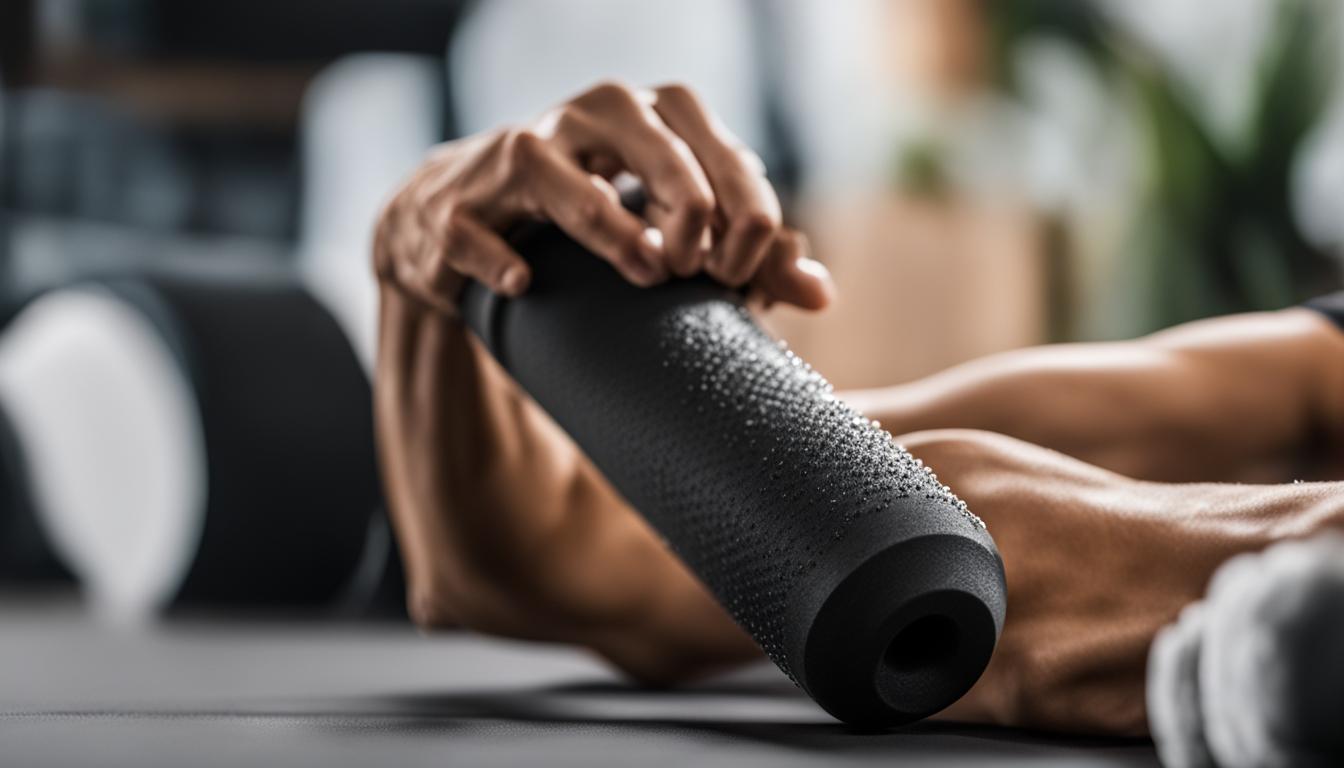Having a solid recovery routine is essential for maximizing the benefits of your workouts. Whether you’re a seasoned athlete or just starting out, post-workout recovery plays a crucial role in muscle repair, reducing muscle soreness, and promoting overall well-being. In this article, we will explore the key strategies and tips to help you optimize your post-workout recovery and get the most out of your exercise routine.
Key Takeaways:
- Post-workout recovery is vital for muscle repair and reducing muscle soreness.
- Refuel your body with the right nutrients and hydrate properly.
- Consider incorporating strategies such as cold baths, massage, and supplements.
- Rest and recovery play an important role in optimizing your overall recovery process.
- Implementing these strategies can help you achieve your fitness goals and enhance your well-being.
The Importance of Recovery After Exercise

Recovery after exercise is crucial for the overall well-being of your body. When you engage in physical activity, your muscles undergo stress and depletion of energy stores. This leads to muscle damage, inflammation, and even immune suppression. Therefore, it is essential to prioritize post-workout recovery to repair and restore your body.
During a workout, your muscles use up energy stores, such as glycogen, to fuel your movements. This depletion of energy can leave you feeling fatigued and with decreased muscle performance. Additionally, exercise causes microscopic damage to your muscle fibers, leading to inflammation and soreness. These factors can contribute to decreased muscle strength and increased risk of injury if not properly addressed.
By incorporating an effective recovery routine, you can mitigate the negative effects of exercise on your body. Recovery allows damaged muscles to repair and grow stronger. It helps replenish energy stores, leading to improved muscle function and performance. Moreover, proper recovery can help reduce inflammation and prevent immune suppression, keeping your body in a healthier state.
The Key Aspects of Post-Exercise Recovery
- Rest: Adequate rest is essential for your body to recover. Make sure to incorporate rest days into your workout routine to allow your muscles time to repair.
- Nutrition: Consuming the right nutrients after exercise is vital for recovery. Prioritize protein to support muscle repair and synthesis, and replenish glycogen stores with carbohydrates. Hydration is also crucial to restore fluid balance and facilitate nutrient delivery.
- Active Recovery: Engaging in light exercise or gentle stretching can promote blood flow, which aids in the removal of metabolic waste and reduces muscle soreness.
- Recovery Techniques: Utilize recovery techniques such as cold baths, foam rolling, or massage to alleviate muscle soreness and enhance recovery.
By incorporating these strategies into your post-workout routine, you can optimize your recovery process and promote overall well-being.
Refuel and Rehydrate
After a challenging workout, it’s crucial to refuel your body with the right nutrients and rehydrate to support optimal recovery. Post-workout nutrition plays a vital role in replenishing energy stores and facilitating muscle repair. Consuming a combination of carbohydrates and protein within an hour of completing your workout can help kickstart the recovery process.
Carbohydrates are essential for replenishing glycogen stores in your muscles, while protein provides the building blocks necessary for muscle repair and growth. Aim for a 3:1 ratio of carbohydrates to protein in your post-workout meal or snack. Good sources of carbohydrates include whole grains, fruits, and vegetables, while lean meats, eggs, and plant-based protein options like beans and tofu are excellent sources of protein.
In addition to proper nutrition, rehydration is key to post-workout recovery. During exercise, your body loses fluids through sweat, so it’s essential to replenish those fluids to maintain hydration. Aim to drink enough water to rehydrate based on your body weight loss during exercise. If you engaged in intense or prolonged physical activity, consider replenishing electrolytes with a sports drink or coconut water to restore the balance of minerals in your body.

Remember, proper post-workout nutrition and hydration are fundamental components of an effective recovery routine. By refueling your body with the right nutrients and rehydrating adequately, you’ll support muscle recovery, optimize performance, and feel your best after each workout.
Recovery Supplements
When it comes to post-workout recovery, incorporating supplements into your routine can provide an extra boost. These supplements can help enhance muscle repair, reduce inflammation, and accelerate recovery. Here are some key supplements to consider:
- Creatine: Creatine has been extensively studied and shown to improve strength, muscle protein synthesis, and glycogen resynthesis. It can be taken as a supplement to support recovery and enhance athletic performance.
- Protein Powder: Protein is crucial for muscle repair and growth. Using a protein powder supplement can provide a convenient and easily digestible source of high-quality protein, helping to support muscle recovery after intense workouts.
- Tart Cherry Juice: Tart cherry juice contains antioxidants and anti-inflammatory properties that can help reduce muscle damage and soreness. Consuming tart cherry juice as a post-workout supplement can aid in recovery and alleviate muscle soreness.
- Glutamine: Glutamine is an amino acid that plays a key role in muscle recovery. Adding a glutamine supplement to your post-workout routine can help accelerate recovery, reduce muscle soreness, and support immune function.
- Omega-3 Fatty Acids: Omega-3 fatty acids have been found to reduce inflammation and promote muscle recovery. Incorporating a supplement rich in omega-3 fatty acids, such as fish oil or flaxseed oil, can provide these essential nutrients to support post-workout recovery.
- Turmeric: Turmeric contains curcumin, a compound with powerful anti-inflammatory properties. Taking a turmeric supplement, especially when combined with black pepper for better absorption, can help reduce inflammation and promote recovery after intense workouts.
It’s important to note that while these supplements can be beneficial for post-workout recovery, they should be used in conjunction with a healthy diet and regular exercise routine. Consult with a healthcare professional or registered dietitian before starting any new supplement regimen to ensure it aligns with your individual needs and goals.
The Importance of Cold Water Immersion for Post-Workout Recovery
When it comes to maximizing post-workout recovery, cold water immersion is a highly effective strategy. Submerging your body in cold water after exercise can provide numerous benefits, including reducing muscle soreness and inflammation, improving muscle strength, and enhancing sleep quality. Cold water immersion works by constricting blood vessels, which helps to reduce inflammation and promote the repair of damaged muscles.
Research has shown that cold water immersion can significantly decrease muscle soreness and accelerate the recovery process. By reducing inflammation in the muscles, it allows for faster healing and repair. Additionally, cold water immersion has been found to improve muscle strength, making it an excellent recovery strategy for athletes and fitness enthusiasts looking to enhance their performance.
Apart from its physical benefits, cold water immersion can also have a positive impact on sleep quality. Taking a cold bath or shower before bed can help lower your body temperature, signaling to your brain that it is time to rest. This can lead to deeper, more restful sleep, which is essential for overall recovery and muscle repair.
Incorporating cold water immersion into your post-workout routine is simple. After exercising, fill a bathtub or a large basin with cold water. Submerge your body in the cold water for 10-15 minutes, focusing on areas that feel particularly sore or fatigued. If you don’t have access to a bathtub, you can also use a cold shower or apply ice packs to specific muscle groups. Remember to gradually increase the water temperature afterward to avoid any uncomfortable fluctuations.

In conclusion, cold water immersion is a highly effective and accessible recovery strategy that can benefit individuals of all fitness levels. By incorporating this technique into your post-workout routine, you can reduce muscle soreness, inflammation, and fatigue, while improving muscle strength and sleep quality. So, the next time you finish a workout, consider taking a cold water plunge to optimize your recovery and enhance your overall well-being.
The Power of Massage and Foam Rolling in Post-Workout Recovery

When it comes to post-workout recovery, incorporating massage and foam rolling into your routine can make a world of difference. These techniques can help alleviate muscle soreness, improve flexibility, and enhance overall muscle recovery. Whether you’re a professional athlete or a fitness enthusiast, here’s why you should consider adding massage and foam rolling to your recovery arsenal.
Massage: A Soothing Touch for Sore Muscles
Massage is a powerful tool for soothing sore muscles and reducing muscle tension. The hands-on manipulation of soft tissues can help increase blood flow, release muscle knots, and promote relaxation. Massage also stimulates the production of endorphins, which are natural painkillers and mood boosters. By incorporating massage into your post-workout routine, you can speed up muscle recovery and reduce the risk of muscle imbalances and injuries.
Foam Rolling: Self-Myofascial Release at Your Fingertips
Foam rolling, also known as self-myofascial release, is a technique that involves using a foam roller to apply pressure to specific muscle groups. This form of self-massage helps break up muscle adhesions and trigger points, improving blood circulation and promoting flexibility. Foam rolling targets the fascia, a connective tissue that surrounds the muscles, which can become tight and restrict movement after intense exercise. By incorporating foam rolling into your post-workout routine, you can enhance muscle recovery, increase range of motion, and prevent injuries.
Both massage and foam rolling should be performed gently and gradually, focusing on the areas that feel tight or sore. Aim to spend around 5-10 minutes on each muscle group, applying enough pressure to provide relief without causing excessive pain. Remember to breathe deeply and relax while performing these techniques, allowing your muscles to fully release and recover.
General Tips for Post-Workout Recovery
Proper post-workout recovery is essential for maximizing the benefits of your exercise routine. Here are some general tips to help you optimize your recovery process:
- Hydration: After a workout, it’s important to replenish the fluids you’ve lost through sweating. Drink enough water to stay hydrated and support your body’s recovery process.
- Healthy Snack: Within 45 minutes of finishing your workout, fuel your body with a nutritious snack or meal. Choose foods that provide a balance of carbohydrates and protein to replenish energy stores and support muscle repair.
- Light Exercise: On your rest days, engage in light exercise such as walking or gentle stretching. This helps promote circulation and prevents muscle cramping.
- Cool Down: Always finish your workout with a cooldown period. Gradually reduce your heart rate and allow your body to recover from the intensity of the exercise.
By incorporating these general tips into your post-workout routine, you can enhance your overall recovery and set yourself up for success in future workouts.
Quote:
“Proper recovery is just as important as the workout itself. Take care of your body and give it the time and resources it needs to repair and grow stronger.”
Remember, everyone’s recovery needs are different, so listen to your body and adjust your routine accordingly. Whether it’s staying hydrated, having a healthy snack, engaging in light exercise, or cooling down properly, each step you take towards post-workout recovery is a step closer to achieving your fitness goals.
Tips for Building Muscle
If your goal is to build muscle, there are specific strategies you can incorporate into your post-workout routine. These tips will help you maximize your muscle growth and optimize your results.
1. Protein Post-Workout: Consuming protein after your workout is crucial for muscle repair and growth. Choose high-quality protein sources such as lean meats, poultry, fish, eggs, or plant-based options like tofu or legumes.
2. Protein Pre-Workout: Prioritize protein intake before your workout as well. This can enhance muscle protein synthesis during your exercise session. Opt for sources like Greek yogurt, protein shakes, or a protein-rich meal.
3. Carbohydrates Post-Workout: Replenishing glycogen stores is essential for muscle recovery. Include carbohydrates in your post-workout meal or snack to provide the energy your muscles need. Opt for options like whole grains, sweet potatoes, or fruits.
4. Protein Options: Experiment with different protein sources to keep your meals interesting. Incorporate a variety of lean meats, seafood, dairy products, and vegetarian protein options to ensure you’re getting a balance of essential amino acids.
5. Carb Choices: When selecting carbohydrates, opt for nutrient-dense options that provide additional benefits. Whole grains, fruits, and vegetables are excellent choices that provide fiber, vitamins, and minerals alongside energy for muscle recovery.
Remember: consistency is key in building muscle. Stay committed to your workout routine and nourish your body with the right nutrients to support muscle growth and recovery.
Tips for Weight Loss
If your goal is weight loss, there are several strategies you can implement to support your journey. Making mindful choices about your food is crucial, starting with regular meals that help maintain muscle mass and keep your metabolism running smoothly. By keeping your body fueled throughout the day, you can avoid excessive hunger and reduce the likelihood of overeating.
When it comes to food choices, focus on options that promote weight loss. Incorporate low-fat dairy products, such as yogurt and cottage cheese, which are rich in protein and can help you feel fuller for longer. Hot peppers, like chili and cayenne, contain capsaicin, a compound that boosts metabolism and aids in burning fat. Whole grains, such as brown rice and quinoa, provide sustained energy and high fiber content, promoting feelings of fullness and aiding in weight loss.
Protein options play a vital role in weight loss as well. Including lean meats, such as chicken breast or turkey, in your diet provides a good source of protein while keeping the fat content low. Additionally, fish high in omega-3 fatty acids, like salmon and tuna, not only support fat burning but also offer numerous health benefits. Omega-3 fatty acids have been shown to reduce inflammation and improve heart health.
Remember, weight loss is a journey that requires patience and consistency. By focusing on regular meals, making thoughtful food choices, and incorporating protein options and whole grains, you can create a well-rounded approach to achieving your weight loss goals.

Key Points:
- Eat regular meals to maintain muscle mass and speed up metabolism.
- Choose foods that promote weight loss, such as low-fat dairy products, hot peppers, and whole grains.
- Incorporate protein options that support fat burning, such as lean meats and fish high in omega-3 fatty acids.
Conclusion
Post-workout recovery is essential for achieving optimal results and promoting muscle repair. By implementing effective recovery strategies, you can enhance your overall well-being and maximize the benefits of exercise.
Refueling and rehydrating with the right nutrients and fluids is crucial for post-workout recovery. Consuming a balanced combination of carbohydrates and protein within an hour of finishing your workout helps replenish energy stores and support muscle repair.
Incorporating recovery supplements can further accelerate the recovery process. Consider incorporating supplements such as creatine, protein powder, tart cherry juice, glutamine, omega-3 fatty acids, and turmeric to aid in muscle repair and reduce inflammation.
Additionally, cold baths and massage are effective recovery strategies. Cold water immersion constricts blood vessels, reduces inflammation, and promotes muscle recovery. Massage and foam rolling help alleviate muscle soreness and tension, improving flexibility and overall recovery.
By following these recovery strategies and incorporating general tips such as hydration, healthy snacks, light exercise, and cooldowns, you can optimize your post-workout recovery and achieve the best possible results for your fitness goals.
FAQ
Why is post-workout recovery important?
Post-workout recovery is important because it helps your body repair damaged muscles, replenish energy stores, and reduce inflammation.
What should I refuel with after a workout?
It is important to refuel with the right nutrients such as carbohydrates and protein to replenish energy stores and support muscle repair.
Are there any supplements that can aid in post-workout recovery?
Yes, certain supplements such as creatine, protein powder, tart cherry juice, glutamine, omega-3 fatty acids, and turmeric can enhance post-workout recovery.
How does a cold bath help with post-workout recovery?
Cold water immersion, also known as a cold bath, can reduce muscle soreness, inflammation, and fatigue by constricting blood vessels, reducing inflammation, and promoting muscle recovery.
What are the benefits of massage and foam rolling for post-workout recovery?
Massage and foam rolling can reduce muscle soreness, promote muscle recovery, improve flexibility, and alleviate muscle tension.
Are there any general tips for post-workout recovery?
Yes, staying hydrated, eating a healthy snack or meal, engaging in light exercise on rest days, and finishing your workout with a cooldown can optimize post-workout recovery.
What are some tips for building muscle during post-workout recovery?
Consuming protein after a workout, eating protein before a workout, and replenishing glycogen stores with carbohydrates are important for muscle building during post-workout recovery.
What are some tips for weight loss during post-workout recovery?
To support weight loss during post-workout recovery, it is important to eat regular meals, choose foods that promote weight loss, and incorporate protein options that support fat burning.


